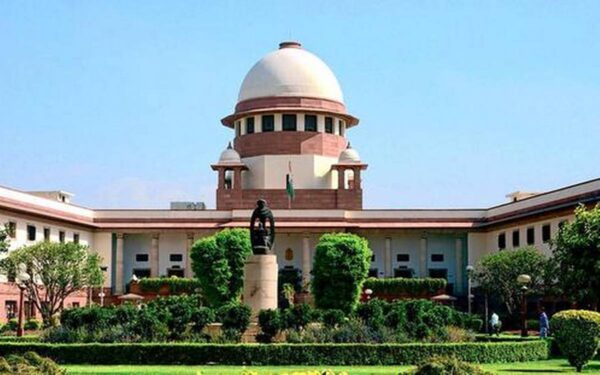The judgment was delivered by a three-judge Bench of Justice Rohinton Nariman, BR Gavai and Hrishikesh Roy.
The Supreme Court on Thursday ruled that balance sheets can amount to acknowledgment of debt under Section 18 of the Limitation Act [Asset Reconstruction Company (India Limited v. Bishal Jaiswal].
The Court, therefore, set aside the five-member Bench judgment of National Company Law Appellate Tribunal (NCLAT) in V Padmakumar v. Stressed Assets Stabilization Fund which had by a 4:1 majority ruled that balance sheet could not be considered as an acknowledgment of debt under Section 18.
“Several judgments of this Court have indicated that an entry made in the books of accounts, including the balance sheet, can amount to an acknowledgement of liability within the meaning of Section 18 of the Limitation Act,” the apex court ruled.
The majority decision of the Full Bench in V Padmakumar is contrary to the catena of judgments of the Supreme Court, the three-judge Bench of Justice Rohinton Nariman, BR Gavai and Hrishikseh Roy ruled.
The judgment was delivered in a plea challenging a judgment of a five-member Bench of National Company Law Appellate Tribunal (NCLAT) which had refused to re-examine the correctness of an earlier judgment in V Padmakumar v. Stressed Assets Stabilization Fund.
In V Padmakumar, the issue was whether reflection of debt in the books of accounts tantamounts to acknowledgment of debt under Section 18 of the Limitation Act, 1963, and thereby extends the period of limitation.
With a 4:1 majority, a five-member bench of NCLAT had held that reflection of debt in the balance sheet could not be considered as an acknowledgment of debt under Section 18 of the Limitation Act.
The majority concluded that the filing of balance sheet being mandatory under Section 92(4) of the Companies Act, 2013, it cannot be treated to be an acknowledgement under Section 18.
If the argument is accepted that the Balance Sheet of the ‘Corporate Debtor’ amounts to acknowledgement under Section 18 then in such case, it is to be held that no limitation would be applicable because every year, it is mandatory for the ‘Corporate Debtor’ to file Balance Sheet, the five-member Bench had ruled.
In September 2020, a three-member Bench doubted the correctness of the decision in V Padmakumar in another case and referred the matter to a five-member Bench to re-examine the correctness of V Padmakumar.
The five-member Bench however dismissed the same leading to the present appeal before the Supreme Court.
The top court placed reliance on a plethora of judgments including Mahabir Cold Storage v. CIT, AV Murthy v. BS Nagabasavanna etc.
The Court also adverted to the exhaustive judgment of the Calcutta High Court in Bengal Silk Mills Co. v. Ismail Golam Hossain Ariff [AIR 1962 Cal 115] which had held that an acknowledgement of liability that is made in a balance sheet can amount to an acknowledgement of debt.
The Court, however, also noted that the Bengal Silk judgment held that though the filing of a balance sheet is by compulsion of law under the Companies Act, the acknowledgement of a debt is not necessarily so.
“In fact, it is not uncommon to have an entry in a balance sheet with notes annexed to or forming part of such balance sheet, or in the auditor’s report, which must be read along with the balance sheet, indicating that such entry would not amount to an acknowledgement of debt for reasons given in the said note,” the judgment said.
Thus, whether an acknowledgement of debt has been made is to be determined on a case by case basis and would depend on the facts of each case as to whether an entry made in a balance sheet with respect to any particular creditor is unequivocal or has been entered into with caveats.
Thus, the Court concluded that V Padmakumar which ruled that balance sheet could not be considered an acknowledgment of debt is incorrect.
Since the NCLAT in the present case did not reconsider V Padmakumar and rubber stamped the same, the said judgment was set aside.
ARCIL was represented by Ramji Srinivasan, Senior Advocate with Abhirup Dasgupta and Ishaan Duggal (HSA Advocates) and Mohit D. Ram, AoR.
L&L Partners through Sanjeev Kumar and Anshul Sehgal appeared for the Resolution Professional.
Interestingly, the five-member Bench of NCLAT had, while dismissing the reference, also made some strong observations against members of the three-member Bench for their reference order.
It termed the reference as “inappropriate”, incompetent” and a “misadventure”.
The NCLAT had further opined that “such misadventures” weaken the authority of law, dignity of institution as also shake people’s faith in rule of law and hoped that the members of the Referral Bench would “exhibit more serious attitude towards adherence of the binding judicial precedents and not venture to cross the red line“.
The three members of the reference Bench had the approached the Supreme Court to expunge the remarks made against them by the five-member Bench in its judgment.
That plea was allowed by the Supreme Court on February 19, 2021,
Source: barandbench.com
Follow us for free tax updates : facebook Twitter
***
Subscribe our portal and get FREE Tax e-books , quality articles and updates on your e-mail.
Resolve your GST queries from national level experts on GST free of cost.
TW Editorial Team comprises of team of experienced Chartered Accountants and Advocates devoted to spread the knowledge of GST amongst the various stakeholders.



This way SC time is getting wasted